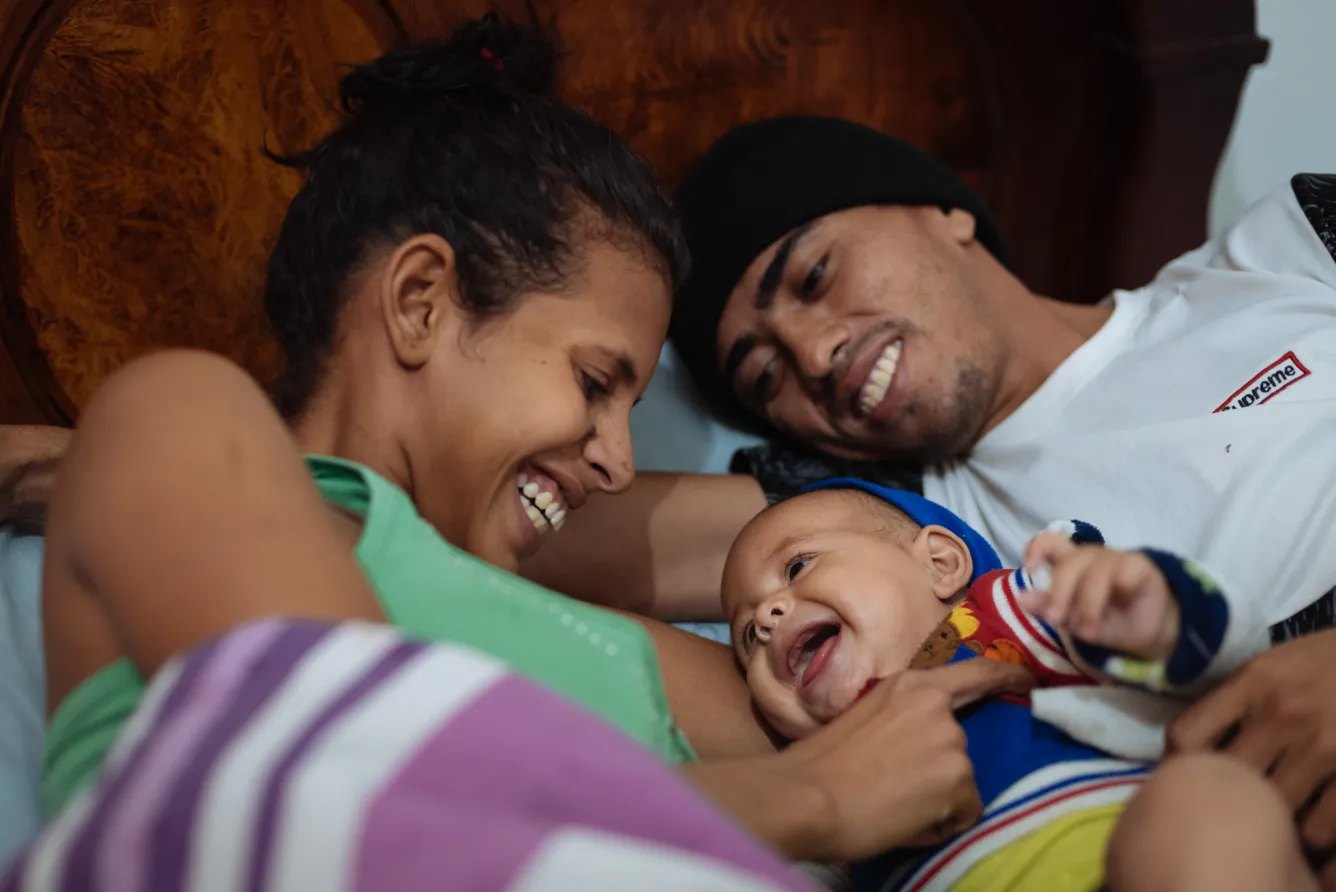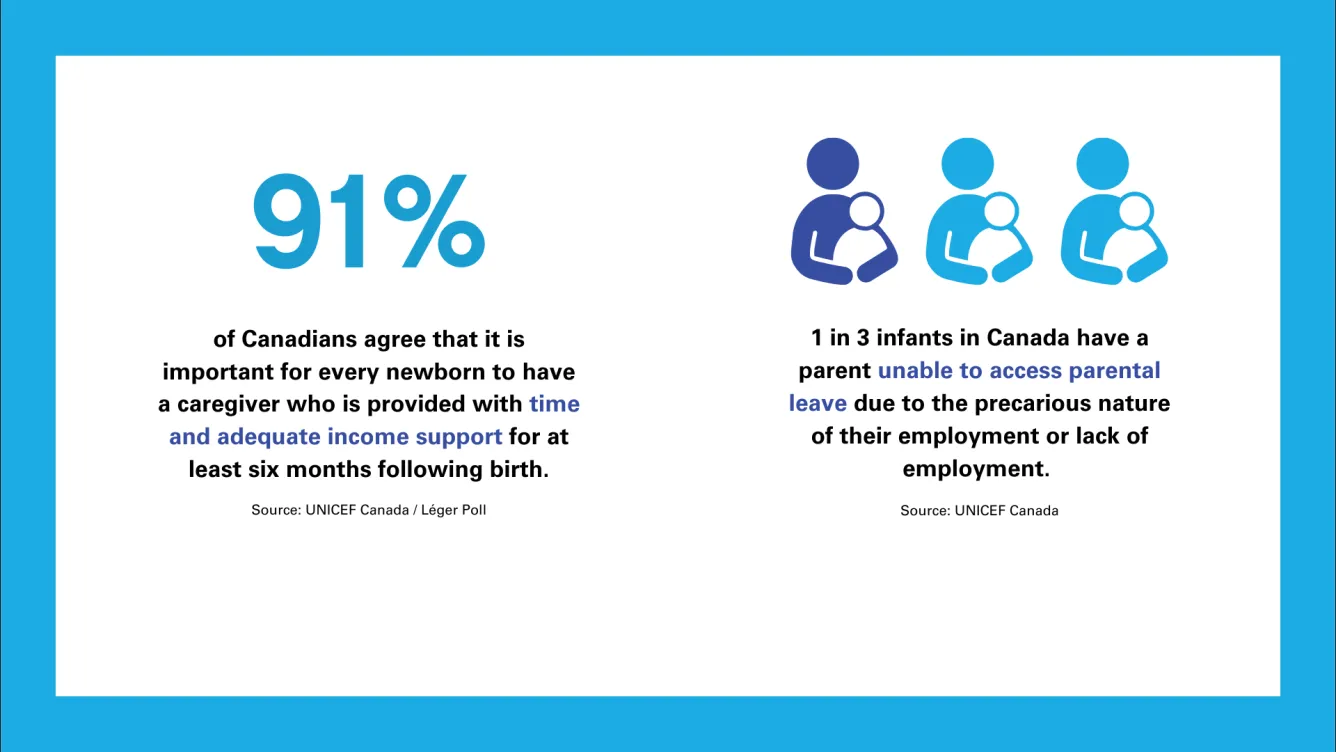Investing in Our Future: A Case for Paid Parental Leave for Every Child
The best possible start in life for every child is the explicit goal of some countries and the cornerstone for every healthy society. Parental leave – a period of adequately paid, sufficient time dedicated to infant care-giving and care-receiving – is a fundamental policy that helps achieve the best start in life.
UNICEF calls parental leave, child-focused income benefits and access to high quality childcare the “family-friendly” policy trifecta. When they are provided universally and adequately, these policies generate many benefits to children, their families and their society that far outweigh their investment.
In recent years, governments at different levels in Canada have stepped up to make child-focused income benefits and childcare more inclusive and effective. Parental leave is a “sleeper” policy that needs a jolt to awaken from political somnolence.
Certainly, parental leave policy has evolved since it was introduced decades ago, most recently by introducing more flexibility for longer leaves, creating provisions for parental leave sharing and marginally increasing inclusion with the recognition of equitable leave time for parents of adopted and surrogate children.
For those who are eligible for paid parental leave (and can afford to take the time on a low rate of pay) the possible duration available to them stacks up favourably when compared to other countries.
But beyond duration, inclusion (eligibility) and pay are the other two fundamental measures of parental leave that really matter – and in these, Canada trails behind most other high-income countries. In fact, Canada has one of the most “exclusive” and poorly paid parental leave benefits among them.
"Having a child is an extremely disruptive and challenging time. As a society, we need to cushion the impact it has on new parents, so they can both learn how to be parents and keep the lights on during one of the most challenging times of their lives."
-Respondent, UNICEF Canada x Léger Public Opinion Poll, June 2024

An unfair start
Close to one in three infants in Canada is deprived of protected and paid care-giving time with a parent or primary care-giver.
Which parents and infants have the privilege of paid parental leave? Only those who qualify for employment insurance can access paid leave. This favours more educated parents with secure and better-paying jobs, making it an inequitable policy in contrast to the intent of income benefit and childcare policies – particularly outside of Quebec. Studies have shown that the parental leave disparity disproportionately affects low-income families, single parents, younger parents including students and those in precarious and “non-standard” employment (such as contract and gig work which are increasingly prevalent forms of employment).
UNICEF Canada’s recent public poll with Léger for UNICEF global Parenting Month in June revealed more dimensions of inequity in parental leave. Parents who have a university degree, are employed, are married or in a common-law relationship and do not identify as a visible minority are significantly more likely to be eligible for paid parental leave.
Yet, even among those who are eligible for paid parental leave, the pay often falls short of what is needed to cover the expenses of caring as well as other expenses such as housing that young families struggle to afford. In fact, parental leave pay outside of Quebec falls well below international standards. Parental leave pay replaces only 55 per cent of weekly earnings for up to 12 months up to a ceiling, falling to 33 per cent for extended leave (18 months). Out of 42 countries of the Organisation for Economic Cooperation and Development (OECD), only Ireland and the United Kingdom had lower average maternity leave pay than Canada in 2021. More than half of high-income countries provide at least six months of fully paid parental leave.
The International Labour Organization Maternity Convention and the European Commission set 67 per cent and 66 per cent, respectively, as the minimum earnings replacement for parental leave. But international evidence suggests an 80 per cent wage replacement rate is necessary to support children’s essential needs and encourage paternal/secondary parent leave. Canadians agree: 85 per cent of UNICEF Canada’s poll respondents said that adequate pay requires more than half one’s salary.
To what parental leave time and pay should new parents and infants be entitled if these care-givers do not have insurance-eligible work or income? Is living below the poverty line acceptable or are they also entitled to income support that would approach the median wage, on par with other parental leave-takers? For the roughly 100,000 infants each year that are born into this situation, the investment to provide paid parental leave for six months would be a small fraction of the federal budget for child income benefits.
The benefits of paid parental leave can only be realized if parents are both eligible for it and can afford to forgo wages and take the leave in practice. As a result, many parents are excluded from the opportunity to care for their newborns in the way they would like to or are compelled to return to work after a very short leave, which can have negative consequences for both parent and child.
Parental leave time and pay is reported to be in very short supply by many UNICEF Canada survey respondents.
Almost half of parents with children under age 5 (41 per cent) took or planned to take less than 6 months of parental leave. One-third of those with paid parental leave (29 per cent) received or expected to receive $5,000 or less.
Only 38 per cent said parental leave was sufficient to meet the needs of their child and family.

The survey also found that most Canadians are unaware of these parental leave inequities: more than three out of four believe that all parents of newborns in Canada benefit from paid parental leave.
Canadians don’t always agree on public policy priorities, but 91 per cent of those polled agree that every newborn should have a caregiver who is provided with time and adequate income support for at least six months following birth.
Why? Almost every survey respondent (95 per cent) could identify at least one positive impact of parental leave on children and their parents. The top three positive impacts they identified are enhanced bonding (71 per cent), increased parental involvement in care (59 per cent) and reduced family stress and anxiety (59 per cent).
There is ample research demonstrating the extensive benefits of adequately paid parental leave of between six and 12 months. It helps foster strong family bonds, supports child health and development and contributes to economic stability, ensuring both child parental well-being. It reduces the risk of preterm birth, infant mortality, family violence and toxic stress. For mothers, parental leave is particularly important as it allows for recovery from childbirth and the opportunity to establish breastfeeding, which has significant health benefits for both mother and child. For fathers and secondary parents, it enables them to bond with their newborns and share the responsibilities of caregiving, promoting gender equality within the household. These outcomes contribute to a more prosperous and equitable society.
Political parties of all stripes also recognize the importance of parental leave. During and since the 2019 federal election, different federal parties have proposed ways to address shortcomings in parental leave inclusiveness and pay. In the 2019 federal election campaign, the Liberal party promised “ambitious” reforms to parental leave to ensure all parents would “receive a guaranteed income during the first year of their child’s life.” Since 2019, all federal Members of Parliament have been entitled to 12 months of parental leave paid at 92 per cent of their wage, though they do not pay into employment insurance.
A time for action
It is time to make good on the promise to ensure parental leave policies work for diverse families—for every child—in a changing society. Paid parental leave should be recognized as a fundamental right for every child, not a privilege dependent on a parent’s employment status or income level. How can Canada deliver on this entitlement?
Guarantee adequately paid, sufficient time with a parent or primary caregiver for every newborn from birth.
For more information about UNICEF Canada’s work on parental leave, please visit unicef.ca/parentalleave.
